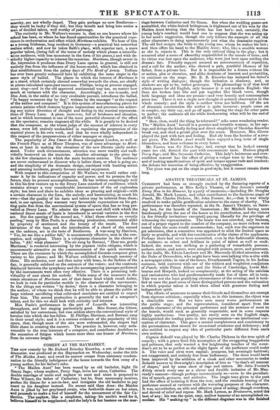COMEDY AT THE HAYMARKET.
THE new comedy by Mr. Richard Brinsley Knowles, a son of the veteran • dramatist, was produced at the Haymarket on Wednesday, under the title of The Maiden Aunt; and owed its narrow escape from summary condem- nation to the friendly indulgence of the house towards the first essay of a young author, for his father's sake. "The Maiden Aunt" has been wooed by an old bachelor, hight Sir Simon Sage; whose nephew, Percy Sage, loves her niece, Catherine. The double marriage of uncle and nephew to aunt and niece is proposed to Peter Wilmot, the father of Catherine; but he, from mercenary motives, prefers Sir Simon for a son-in-law, and instigates the old bachelor to pay court to his daughter instead. No sooner said than done: the Maiden Aunt is jilted by her greybeard swain, who forthwith doats on her niece, and proceeds to make a fool of himself for the amusement of the fair Ca- therine. The nephew, like a simpleton, taking• his uncle's word for it, believes himself to be supplanted; and the lady's fa her hastens on the mar- siege between Catherine and Sir Simon. But when the wedding guests are assembled, the white-haired bridegroom is frightened out of his wits by the Maiden Aunt hinting that the bride has lost her's: and, certainly, the young lady's conduct would lead one to suppose that she was acting up to her aunt's suggestion, though she only follows the example of all the other characters in doing spontaneously just what the dramatist requires. The old fool resigns the bride to the young one, whom he makes his heir; and then offers his hand to the Maiden Aunt; who, like a sensible woman as she is, rejects it. This is the only rational thing in the play; but it occurred after a scene of absurdity unparalleled in the annals of farce; and its virtue was lost upon the audience, who were just bent upon settling the drama's fate. Friendly support secured an announcement of repetition, and a call for the author; who showed a pale, youthful likeness of his father, from a private box. But it is impossible for a drama without life or action, plot or situation, and alike destitute of interest and probability, to continue on the stage. Mr. R. B. Knowles has imitated his father's style of writing dialogue; though the imitation is shadowy, and, as shadows are apt to be, rather grotesque. The phraseology is of that kind which passes for old English, only because it is not modern English: the lines are broken into bits and put together like blank verse, though both language and ideas are prosaic—and very homely and commonplace prose too. There is not a single new thought or pointed observation in the whole comedy; and the style is neither terse nor brilliant. Of the art of dramatic construction the author is quite innocent: people come on in couples, say their say, and go off again, leaving the stage for other pairs to parley; the audience all the while foreknowing what will be the end of all the talk.
" How, then, could the thing be tolerated?" asks some wondering reader. The "Maiden Aunt" herself is a genuine and loveable woman; in her say- ings and doings the kindly feeling and direct simplicity of Sheridan Knowles break out, and shed a genial glow over the scene. Moreover, Mrs. Glover played the part with tact and feeling. Had she been the heroine of a two- act piece, The Maiden Aunt would have enjoyed a long term of single blessedness, and been welcome in every house.
Mr. Ferrer' was Sir Simon Sage; and, except that he looked twenty years too old, dressed the part with consummate taste. Hudson played Percy Sage; and Mrs. Seymour Catherine. This lady's boisterous and over- confident manner has the effect of giving a vulgar tone to her vivacity, and of making manifestations of spirit and temper appear rude and insolent: she defeats her intention of being effective, by exaggeration.
The piece was put on the stage in good style, but it cannot remain there long.


























 Previous page
Previous page